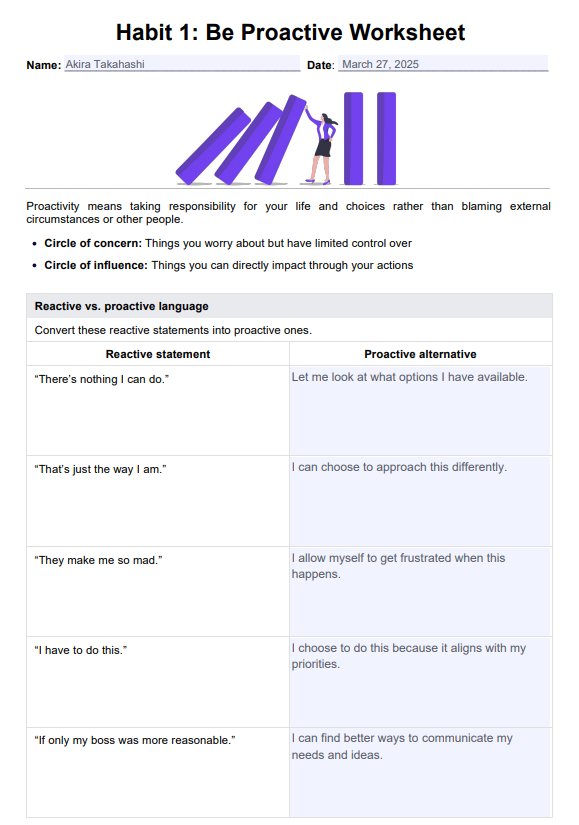Habit 1: Be Proactive Worksheet
Help clients improve control and focus and learn to be more proactive with our Habit 1: Be Proactive Worksheet.


What does being proactive mean?
Being proactive is one of the healthy habits that individuals should develop as they face life's challenges. As Stephen Covey (2013) explains in his book The 7 Habits of Highly Effective People, proactivity involves taking responsibility for one's life and actions. Covey emphasizes that proactivity goes beyond mere initiative. It means recognizing that our behavior is a function of our decisions rather than our conditions.
This concept of "response-ability," or the ability to choose one's response, highlights that proactive individuals do not blame external circumstances for their behavior. Instead, they make conscious choices based on their values. Unlike reactive people, who are influenced by their environment, proactive individuals carry their own "weather" with them. This means they maintain consistent performance and attitude regardless of external conditions.
Proactive people are driven by internalized values rather than external stimuli or social environments. They choose their responses based on these values, not feelings or circumstances. A proactive mindset is like preventive medicine for the mind. It means anticipating and addressing potential issues before they become serious problems.
This ability is crucial for mental health practitioners to understand and teach their clients, enabling them to lead more empowered and self-directed lives.
By encouraging clients to adopt a proactive approach, practitioners can empower them to make positive lifestyle choices and take early action to prevent further complications or problems. This can be more advantageous than focusing and worrying about things they have little or no control over.
Habit 1: Be Proactive Worksheet Template
Habit 1: Be Proactive Worksheet Example
How does our Habit 1: Be Proactive Worksheet work?
Guiding clients toward being proactive, the first of the seven habits, doesn't have to be challenging. The worksheet is easy to use. You just have to follow these steps:
Step 1: Download the worksheet
Click "Download" on this page to get a fillable PDF copy of the proactive worksheet, habit 1 of the 7 Habits of Highly Effective People. You can also click "Use template" to open and edit it within the Carepatron platform before giving it to clients.
Step 2: Write client information
Have clients write their name and the date at the top of the worksheet. This personalizes the document and sets the stage for meaningful reflection.
Step 3: Let clients reframe and reflect
Guide clients to practice reframing reactive language into more proactive language. Then, let them reflect on what is within their circles of concern and influence.
Step 4: Practice proactive response planning
Let clients practice responding more proactively to a challenging situation they currently face, including their typical response, an alternative proactive response, and specific actions they can take.
When should you use this worksheet?
Individuals, teachers, and professionals can use our first habit of being proactive worksheet and anyone looking to take control of their lives. It is beneficial at the beginning of new engagements, during clients' periods of change, or when they face new challenges. Here are some instances where it can be helpful:
- School setting: Teachers can integrate the worksheet into their class and lessons to teach students the value of being proactive. This reinforces the habits of highly effective individuals and is helpful for students learning to grow academically and personally.
- Managing stress and challenges: The worksheet allows individuals to plan and act on their goals, reducing stress and feeling more in control. It shifts the mindset from reactive to proactive, enabling better challenge management.
- Aligning actions with values: The worksheet encourages individuals to reflect on their values and ensure they match these values and purpose. This alignment allows focus, which helps lead a purposeful life and make decisions that are true to one's personality and beliefs.
- Building responsibility and accountability: Completing the worksheet regularly helps individuals become more responsible and accountable for their actions. It promotes a sense of ownership and the ability to act on plans.
Clients may use the worksheet to plan proactively at the start of a new day, week, or endeavor. It can also be helpful when feeling overwhelmed or reactive, providing a structured way to refocus and take charge.
Reference
Covey, S. R. (2013). The 7 habits of highly effective people: Powerful lessons in personal change. Simon & Schuster.
Commonly asked questions
Being proactive means taking responsibility for one's own actions and making decisions based on values rather than reacting to external circumstances.
Develop the habit of being proactive by consistently choosing responses based on values, reflecting on one's decisions, and practicing self-awareness.
Examples of proactive behavior include planning ahead, setting personal goals, and taking the initiative to solve problems before they escalate.





















-template.jpg)

















































































